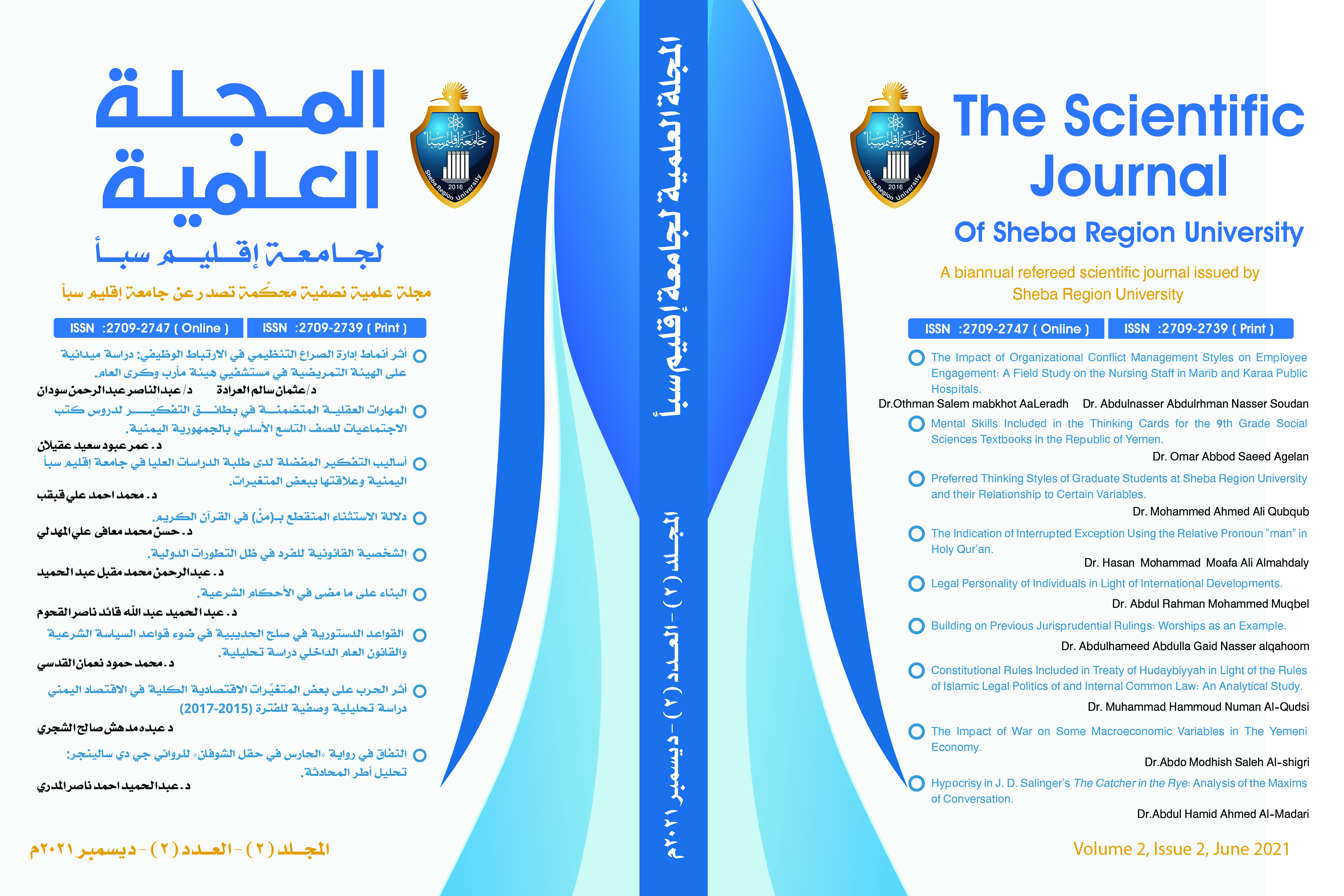أثر أنماط إدارة الصراع التنظيمي في الارتباط الوظيفي: دراسة ميدانية على الهيئة التمريضية في مستشفيي هيئة مأرب وكرى العام
The Impact of Organizational Conflict Management Styles on Employee Engagement: A Field Study on the Nursing Staff in Marib and Karaa Public Hospitals.
DOI:
https://doi.org/10.54582/TSJ.2.2.1Keywords:
أنماط إدارة الصراع التنظيمي , الارتباط الوظيفي, conflict management styles, employee engagementAbstract
هدفت الدراسة إلى التعرف على أثر أنماط إدارة الصراع التنظيمي (المشاركة، والإرضاء والسيطرة، والتجنب، والمساومة) على الارتباط الوظيفي (الارتباط المعرفي، والارتباط السلوكي والارتباط العاطفي).
منهجية الدراسة: استخدمت الدراسة المنهج الوصفي التحليلي، بالإضافة إلى الدراسة الميدانية. تألف مجتمع الدراسة من الممرضين في هيئة مستشفى مأرب، ومستشفى كرى بمحافظة مأرب، والبالغ عددهم (172) ممرضًا، وتم اختيار عينة عشوائية بسيطة بلغت (118) ممرضًا وتم إجراء التحليلات الإحصائية باستخدام الحزمة الإحصائية للعلوم الاجتماعية (Version 24) SPSS للتأكد من صحة اختبار الفروض وقد تم استخدام الاستقصاء كوسيلة للحصول على البيانات.
نتائج الدراسة: توصلت الدراسة إلى أنَّ نمطي: (المشاركة والإرضاء) يؤثران تأثيرًا إيجابيًا ومعنويًا على الارتباط الوظيفي، والارتباط المعرفي والسلوكي، والعاطفي. كما يوجد أثر إيجابي ومعنوي بمستوى ضعيف لنمطي (السيطرة، والتجنب) على الارتباط المعرفي، والسلوكي ولم يتحقق هذا الأثر على الارتباط العاطفي. كما أفادت النتائج أنه يوجد أثر إيجابي ومعنوي لنمط المساومة على الارتباط العاطفي ولم يتحقق هذا الأثر على الارتباط المعرفي والسلوكي.
الكلمات المفتاحية: أنماط إدارة الصراع التنظيمي، الارتباط الوظيفي.
This study aimed at identifying the effect of organizational conflict management styles on employee engagement. The study adopted the descriptive and analytical method, in addition the field study for data collection. The sample population consisted of the (172) nurses in the Marib General Hospital and Kara Hospital in the Marib a simple random sample of (118) nurses was selected. The findings revealed that both the integrating and obliging styles have a strong positive and significant effect on employee engagement (cognitive, behavioral and emotional). The findings also revealed that there is also a positive and weak effect of both the dominating and avoiding styles on the employee engagement and its cognitive and behavioral dimensions. This effect is not achieved on the emotional dimension. Furthermore, there is a positive moral effect of the compromising style on the overall employee engagement and the emotional dimension. This effect, however, is not achieved on the cognitive and behavioral link.
Downloads
Published
How to Cite
Issue
Section
License
Copyright and Licensing
This journal publishes all scientific materials under the Creative Commons Attribution 4.0 International (CC BY 4.0) , license, which grants you the following permissions:
You are free to:
- Share — copy and redistribute the material in any medium or format for any purpose, even commercially.
- Adapt — remix, transform, and build upon the material for any purpose, even commercially.
- The licensor cannot revoke these freedoms as long as you follow the license terms.
Under the following terms:
- Attribution — You must give appropriate credit , provide a link to the license, and indicate if changes were made . You may do so in any reasonable manner, but not in any way that suggests the licensor endorses you or your use.
- No additional restrictions — You may not apply legal terms or technological measures that legally restrict others from doing anything the license permits.
Notices:
You do not have to comply with the license for elements of the material in the public domain or where your use is permitted by an applicable exception or limitation .
No warranties are given. The license may not give you all of the permissions necessary for your intended use. For example, other rights such as publicity, privacy, or moral rights may limit how you use the material.











